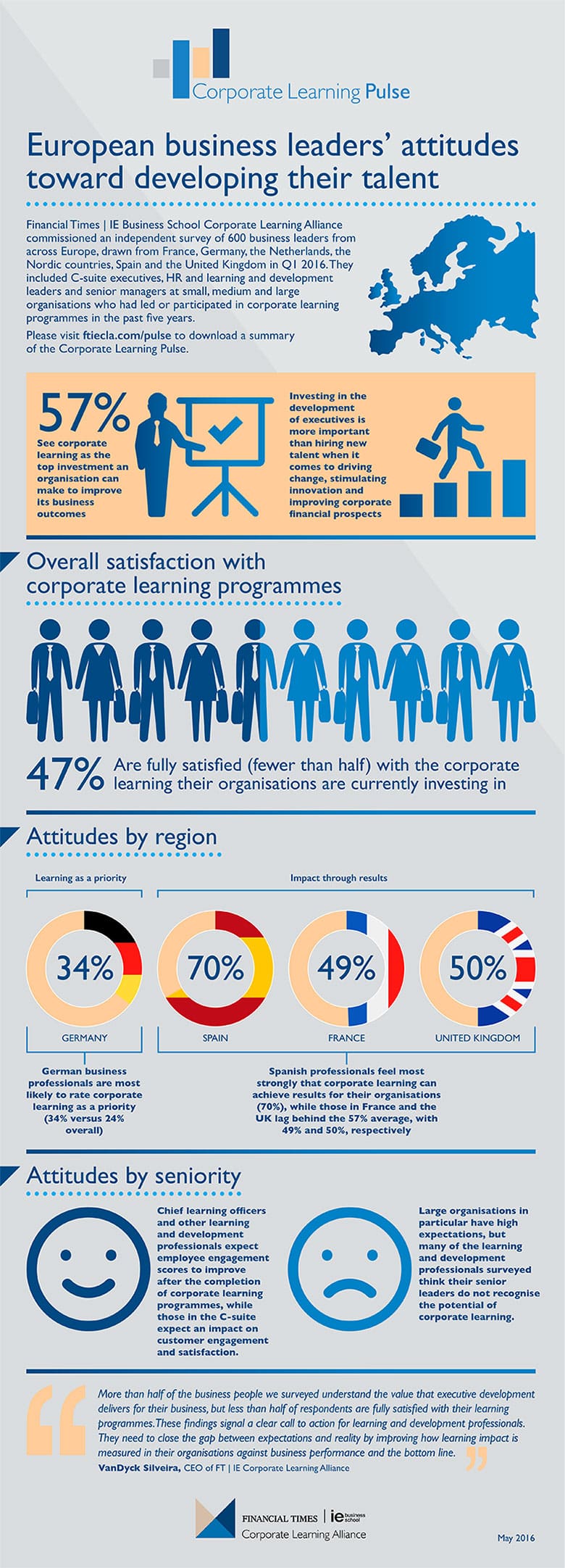European study reveals C-suite priorities for business growth and executive development

The financial crisis of 2008, allied to the continuing upheaval in politics that most recently culminated in the UK’s Brexit vote, seem to be pointing to a collapse of trust in institutions and corporations. What can companies and their leaders do to restore faith in their business, not least among their own employees? What kind of investments in people do they believe will have the greatest impact on their companies’ business performance and on the development of their staff? A new European study into attitudes among the C-Suite and senior managers seeks some answers.
The survey of 600 business leaders working in Europe was published in the spring of 2016 by Financial Times | IE Business School Corporate Learning Alliance. C-suite executives, senior managers, HR and learning and development leaders in small, medium and large organisations who have led or participated in corporate learning programmes in the past five years were surveyed. The report – Corporate Learning Pulse – focuses on France, Germany, the Netherlands, the Nordic countries, Spain and the United Kingdom.
The study reveals broad agreement among executives working at different levels of an organisation about the kind of investment and management approach that can lead to business growth.
But there are some interesting differences between the attitudes of the C-Suite and senior managers when they are asked to state their own top priorities for their organisations. The more strategic outlook among the C-Suite underlines their greater focus on leadership, innovation and international expansion. This contrasts with a stronger emphasis by senior management below the C-Suite on strategy execution, financial management and adapting to advances in technology.
The not unexpected focus among learning and development professionals on the need for organisational change and executive development to transform their businesses is more marked.
Yet business leaders in this study all see their employees as the key to strategy implementation, whether the aim is to increase customer satisfaction (a specific concern among the C-Suite), improve the functional expertise of their managers, or grow their level of trust in their company. Regardless of a respondent’s level within an organisation, from senior managers upwards, belief in the power of employees is strong, and stronger still among the C-Suite. Their belief in employees to enact and push change in their organisation aligns with their top business priorities.
In fact the confidence in executive development to help deliver their business goals appears robust –and is considered to be more important even than hiring new talent (which nevertheless comes close) when it comes to driving change, stimulating innovation and improving corporate financial prospects.
Corporate learning as a top investment
The C-Suite respondents in the survey value corporate learning highly but there is a desire among them for improvements in the programmes their companies invest in. They feel less optimistic about the outcomes from an investment in learning than the senior professionals who manage the day-to-day operations in their organisations. Interestingly, professionals that are somewhat removed from senior management teams have the strongest belief that corporate learning can improve outcomes for their organisation.
So if executive development is seen as a good investment, what are the reasons for doing it? The corporate learning needs deemed most valuable across all the survey’s respondents are (in order of preference) customer engagement, strategy and planning, successful innovation, leadership and strategy execution.
Yet in spite of this strong approval of executive development as a business practice, fewer than half the executives surveyed are satisfied with the corporate learning their organisations are currently investing in. An important reason is this inherent difficulty of assessing their impact. Many of the programmes that are currently designed and delivered are more concerned with short-term results based on personal executive development than on the longer-term positive effects on company performance. However, the survey’s respondents still claim they want learning to drive business outcomes for their organisations.
So there is a lingering question among the respondents in the Corporate Learning Pulse about how to gauge the impact of executive development. Most of the organisations in the survey have sought at some time to measure the impact of corporate learning on employee satisfaction and retention. And alongside this internal focus, many have also sought to measure the effect on customer satisfaction, revenue and profit.
Interestingly, looking at the fine detail, the study reveals an apparent disconnect between the attitudes of the C-Suite and others. The most senior survey respondents – C-Suite, Presidents and Managing Directors – believe that corporate learning has had a positive impact on their organisation and that past investments have been worth it to their organisation. However, these beliefs begin to fall among senior professionals who are further removed from the boardroom and more focused on day-to-day operations within their organisations. Senior managers are the least likely to say learning and development is embedded in their culture or that executive education programmes are aligned with the overall strategy of their company.
This data shines a light on the executive education sector and the importance of making corporate learning programmes as beneficial and relevant as possible, not only to the individual but also the organisation as a whole. Executives and HR leaders often complain that executive learning programmes are too academic and abstract, with scenarios based on past events rather than the challenges they face today. By customising programmes so they reflect real-world issues, business leaders can get the tools they need to analyse real challenges and help them develop viable solutions for their own companies.
Conservative behaviour
When the data is weighed against responses related to how organisations choose executive education partners, it reveals the pressure they are under to act conservatively.
When asked how they tend to choose their corporate learning partners, only one in four respondents say their organisation makes its decision based on a provider’s ability to measure impact for clients. The top choice is working with partners they have used in the past. And in fact for the C-Suite, presidents and MDs, rankings and reputation are the most important factors they consider when choosing learning partners, which further illustrates the pressure decisions-makers and purchasers face from internal stakeholders. In an organisational climate where all budgets and investments are heavily scrutinised, it is perhaps unsurprising that some organisations find it difficult to take a risk.
So while only one in four of the executives surveyed currently expect learning programmes to lead to real business impact, there is evidence that more want to be able to measure the outcome and demonstrate that impact to internal stakeholders.
The results from the Corporate Learning Pulse suggest that corporate learning has focused in the past on basic tools and not enough on how the learnings from programmes translate to strategy delivery and support an organisation in a rounded way. To deliver impactful programmes will, in some cases, require organisations to shift their own perceptions of corporate learning: how it can be delivered, what it should focus on and, most importantly, how it fits into strategy development and execution.
Resources
Corporate learning Pulse full report | Animated video showing the key findings | Interview with FT | IE Corporate Learning Alliance CEO.
About the research study
The research was commissioned by Financial Times | IE Business School Corporate Learning Alliance from Research Now Group, an independent digital data collection company. Responses were collected between 19 February and 7 March 2016. The study covered 603 senior professionals and included company owners, CEOs, CFOs, chairmen, presidents/managing directors, chief learning officers, directors, human resource managers, learning and development managers/professionals and senior managers. Data was collected to track business sector and size of business.
——
This article is published in collaboration with Financial Times | IE Business School Corporate Learning Alliance. The views expressed in this article are those of the author alone and not the CEOWORLD Magazine.
Bring the best of the CEOWORLD magazine's global journalism to audiences in the United States and around the world. - Add CEOWORLD magazine to your Google News feed.
Follow CEOWORLD magazine headlines on: Google News, LinkedIn, Twitter, and Facebook.
Copyright 2025 The CEOWORLD magazine. All rights reserved. This material (and any extract from it) must not be copied, redistributed or placed on any website, without CEOWORLD magazine' prior written consent. For media queries, please contact: info@ceoworld.biz









